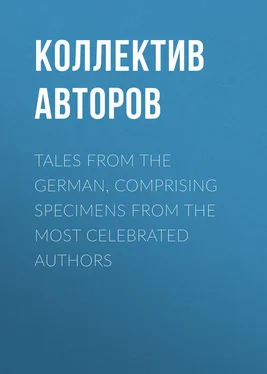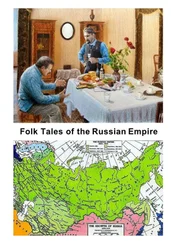Коллектив авторов - Tales from the German, Comprising specimens from the most celebrated authors
Здесь есть возможность читать онлайн «Коллектив авторов - Tales from the German, Comprising specimens from the most celebrated authors» — ознакомительный отрывок электронной книги совершенно бесплатно, а после прочтения отрывка купить полную версию. В некоторых случаях можно слушать аудио, скачать через торрент в формате fb2 и присутствует краткое содержание. Жанр: literature_18, foreign_antique, foreign_prose, Сказка, на английском языке. Описание произведения, (предисловие) а так же отзывы посетителей доступны на портале библиотеки ЛибКат.
- Название:Tales from the German, Comprising specimens from the most celebrated authors
- Автор:
- Жанр:
- Год:неизвестен
- ISBN:нет данных
- Рейтинг книги:4 / 5. Голосов: 1
-
Избранное:Добавить в избранное
- Отзывы:
-
Ваша оценка:
- 80
- 1
- 2
- 3
- 4
- 5
Tales from the German, Comprising specimens from the most celebrated authors: краткое содержание, описание и аннотация
Предлагаем к чтению аннотацию, описание, краткое содержание или предисловие (зависит от того, что написал сам автор книги «Tales from the German, Comprising specimens from the most celebrated authors»). Если вы не нашли необходимую информацию о книге — напишите в комментариях, мы постараемся отыскать её.
Tales from the German, Comprising specimens from the most celebrated authors — читать онлайн ознакомительный отрывок
Ниже представлен текст книги, разбитый по страницам. Система сохранения места последней прочитанной страницы, позволяет с удобством читать онлайн бесплатно книгу «Tales from the German, Comprising specimens from the most celebrated authors», без необходимости каждый раз заново искать на чём Вы остановились. Поставьте закладку, и сможете в любой момент перейти на страницу, на которой закончили чтение.
Интервал:
Закладка:
His heart beat joyfully – only because it did beat; but now he looked back with horror on his past life, as he did on the thunderstorm that was destroying the beautiful forest on his right and left. He thought of his wife, a beautiful, good woman, whom he had murdered from avarice; he appeared to himself an outcast from mankind, and wept bitterly as he reached the hill of the glass-mannikin.
The Schatzhauser was sitting under a pine-tree, and was smoking a small pipe; but he looked more serene than before.
"Why do you weep, Peter?" asked he, "have you not recovered your heart? Is the cold one still in your breast?"
"Alas! sir," sighed Peter, "when I still carried about with me the cold stony heart, I never wept, my eyes were as dry as the ground in July; but now my old heart will almost break with what have done. I have driven my debtors to misery, set the dogs on the sick and poor, and you yourself know how my whip fell upon her beautiful forehead."
"Peter, you were a great sinner," said the little man. "Money and idleness corrupted you, until your heart turned to stone, and no longer knew joy, sorrow, repentance, or compassion. But repentance reconciles; and if I only knew that you were truly sorry for your past life, it might yet be in my power to do something for you."
"I wish nothing more," replied Peter, dropping his head sorrowfully. "It is all over with me, I can no more rejoice in my lifetime; what shall I do thus alone in the world? My mother will never pardon me for what I have done to her, and I have perhaps brought her to the grave, monster that I am! Elizabeth, my wife, too, – rather strike me dead, Herr Schatzhauser, then my wretched life will end at once."
"Well," replied the little man, "if you wish nothing else, you can have it, so my axe is at hand." He quietly took his pipe from his mouth, knocked the ashes out, and put it into his pocket. Then rising slowly, he went behind the pines. But Peter sat down weeping in the grass, his life had no longer any value for him, and he patiently awaited the deadly blow. After a short time, he heard gentle steps behind him, and thought, "Now he is coming."
"Look up once more, Peter Munk," cried the little man. He wiped the tears from his eyes and looked up, and beheld his mother, and Elizabeth his wife, who kindly gazed on him. Then he jumped up joyfully, saying, "You are not dead, then, Elizabeth, nor you, mother; and have you forgiven me?"
"They will forgive you," said the glass-mannikin, "because you feel true repentance, and all shall be forgotten. Go home now, to your father's hut, and be a charcoal-burner as before; if you are active and honest, you will do credit to your trade, and your neighbours will love and esteem you more than if you possessed ten tons of gold." Thus saying, the glass-mannikin left them. The three praised and blessed him, and went home.
The splendid house of wealthy Peter stood no longer; it was struck by lightning, and burnt to the ground, with all its treasures. But they were not far from his father's hut, and thither they went, without caring much for their great loss. But what was their surprise when they reached the hut; it was changed into a handsome farm-house, and all in it was simple, but good and cleanly.
"This is the glass-mannikin's doing," cried Peter.
"How beautiful!" said Frau Elizabeth; "and here I feel more at home than in the larger house, with many servants."
Henceforth Peter Munk became an industrious and honest man. He was content with what he had, carried on his trade cheerfully, and thus it was that he became wealthy by his own energy, and respected and beloved in the whole forest. He no longer quarrelled with his wife, but honoured his mother, and relieved the poor who came to his door. When, after twelvemonths, Fran Elizabeth presented him with a beautiful little boy, Peter went to the Tannenbühl, and repeated the verse as before. But the glass-mannikin did not show himself.
"Mr. Schatzhauser," he cried loudly, "only listen to me. I wish nothing but to ask you to stand godfather to my little son." But he received no answer, and only a short gust of wind rushed through the pines, and cast a few cones on the grass.
"Then I will take these as a remembrance, as you will not show yourself," cried Peter, and he put them in his pocket, and returned home. But when he took off his jacket, and his mother turned out the pockets before putting it away, four large rolls of money fell out; and when they opened them, they found them all good and new Baden dollars, and not one counterfeit, and these were the intended godfather's gift for little Peter, from the little man in the Tannenbühl. Thus they lived on, quietly and cheerfully; and many a time Peter Munk, when gray-headed, would say, "It is indeed better to be content with little, than to have wealth and a cold heart."
C. A. F.
THE WONDERS IN THE SPESSART
[This tale occurs in the novel of "Münchhausen," the narrator telling it to the object of his affections. It is necessary to state this to render the opening intelligible. The story is probably intended to satirize the speculative tendency of the Germans, and old Albertus Magnus seems a sort of representative of Hegel, whom Immermann openly attacks in the course of the "Münchhausen." To me the expression "dialectic thought," which occurs in the Hegelian sense at p. 85, is conclusive in this respect. – J. O.]
"Did you ever, Lisbeth, on a clear sunny day, go through a beautiful wood, in which the blue sky peered through the green diadems above you, where the exhalation of the trees was like a breath of God, and when thy foot scattered a thousand glittering pearls from the pointed grass?"
"Yes, lately, Oswald dear, I went through the mountains to collect the rents. It is delightful to walk in a green fresh wood; I could ramble about one for whole days without meeting a soul, and without being in the least terrified. The turf is God's mantle, and we are guarded by a thousand angels, whether we sit or stand upon it. Now a hill – now a rock! I ran and ran, because I always thought, 'Behind, then, must be flying the wonderful bird with its blue and red wings, its golden crown upon its head.' I grew hot and red with running, but not weary. One does not get weary in a wood."
"And when you did not see the wonderful bird behind the hill in the hedge, you stood still hard-breathing, and you heard afar in the valley of oaks the sound of the axe, which is the forest clock, and tells that man's hour is running even in such a lovely solitude."
"Or farther, Oswald, the free prospect up the hill between the dark round beeches, and still closer, the brow of the hill crowned with lofty trunks! There red cows were feeding, and shook their bells, there the dew on the grass gave a silvery hue to the sunlit valley, and the shadows of the cows and the trees played at hide-and-seek with each other."
"Well, then, on such a sunny morning many hundred years ago, two young men met one another in the wood. It was in the great woody ridge of mountains, called Spessart, which forms the boundary between the joyous districts of the Rhine and the fertile Fraconia. That is a wood, dear Lisbeth, which is ten leagues broad and twenty long, covering plains and mountains, clifts and valleys.
"On the great highway, which runs straight from the Rhine-land to Würzburg and Bamberg, these young men met each other. One came from the west, the other from the east. Their animals were as opposite as their directions. The one from the east sat upon a bay horse, which pranced merrily, and he looked right stately in his gay armour, and his cap of red velvet, from which the heron's plume descended; the one from the west wore a black cap without any mark of distinction, a long student's cloak of the same colour, and rode on a humble mule.
Читать дальшеИнтервал:
Закладка:
Похожие книги на «Tales from the German, Comprising specimens from the most celebrated authors»
Представляем Вашему вниманию похожие книги на «Tales from the German, Comprising specimens from the most celebrated authors» списком для выбора. Мы отобрали схожую по названию и смыслу литературу в надежде предоставить читателям больше вариантов отыскать новые, интересные, ещё непрочитанные произведения.
Обсуждение, отзывы о книге «Tales from the German, Comprising specimens from the most celebrated authors» и просто собственные мнения читателей. Оставьте ваши комментарии, напишите, что Вы думаете о произведении, его смысле или главных героях. Укажите что конкретно понравилось, а что нет, и почему Вы так считаете.












